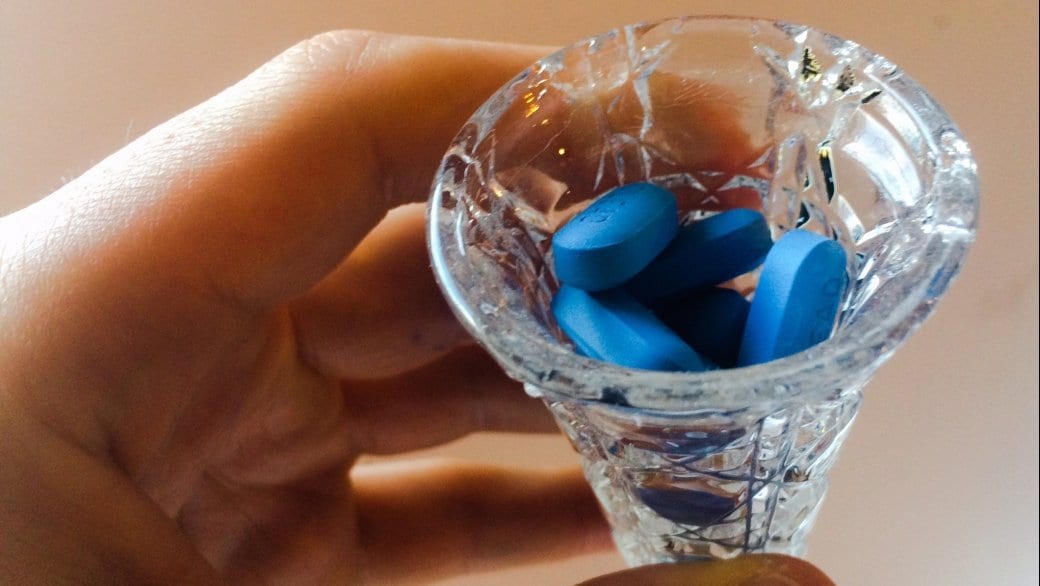As I finished my second drink, my friend John began telling me about the time he got rectal chlamydia. “It was shortly after I started taking PrEP,” he said. “Of course it was from the first and only person I barebacked. I decided after that to keep wearing condoms.” This anecdote came in response to my mentioning the Toronto man who’d tested positive for HIV despite a long-term adherence to Truvada as PrEP. This man contracted a strain of the virus that was resistant to both drugs found in the pills, tenofovir and emtricitabine. It’d only been a couple of days since the case had become news, but it seemed like every gay man in New York was talking about it, even though nobody seemed to really understand what it actually meant.
David C Knox, the doctor who treated the patient in this particular case, presented a study at the 2016 Conference of Retroviruses and Opportunistic Infections in Boston, which I was able to stream online. He stated that the failure of PrEP was likely due to the transmission of a multi-class resistant strain of HIV-1. It was the first time that a researcher had documented a case of someone contracting such a strain while adhering to PrEP long-term. It suddenly became clear to me how much of an evolving science this actually was.
I then read an article where Richard Harrigan, the director of the lab program at British Columbia Center for Excellence in HIV/AIDS in Vancouver, said, “I think we would assume that the efficacy of PrEP would be lower if there is exposure to virus which is resistant to either drug, and lowered further if there is exposure to virus resistant to both drugs.”
This just led me to more concerning questions. Studies have shown that PrEP is 99 percent effective in the prevention of HIV. Some people on the PrEP Facts Facebook group were saying that this particular case was the unfortunate one percent chance. This made sense to me, but there was one thing I kept wondering about: If this Toronto man contracted a PrEP-resistant strain of the virus, could it mean there was a new strain of HIV circulating throughout the city? Could others become infected with this particular strain?
After some digging, a friend from a men’s health organization put me in contact with Darrell Tan, who leads the PREP-5 study out of St Michael’s Hospital in Toronto. It turns out he is also the senior author of the paper that Knox had presented. Tan explained that in regards to risk, if you’re taking Truvada for PrEP, you’d need to encounter someone who has a strain of HIV that is resistant to the two drugs that make up the drug. He assured me that although this had happened once in this case, it was very rare. This person would also need to have a high viral load, and then you’d need to have condom-less sex. Finally, you would need to actually contract the virus from sex, which is more difficult than we often realize. That’s why they’ve maintained the risk to be one percent.
I asked whether this strain of HIV could possibly be circulating in Toronto as we speak. “Absolutely, that’s a possibility,” he said, but explained that it was being monitored to a certain degree.
After ordering another round of drinks, John began to tell me about porn he’d seen where a guy took 100 cum loads over the course of a day. There was envy and curiosity in his voice as he explained how carefree the whole thing seemed. “I really wanted to do that,” he confessed. “I thought it was hot and was actually working myself up to it mentally. I was getting close but I guess after this week I shouldn’t.”
I took a sip of my beer and thought how hot it would be to take several loads, one after another, indiscriminately. I’ve had similar fantasies of relentless, bareback gangbangs. At the same time, I couldn’t shake the thought of this particular strain. Regardless, thinking critically about this case, paranoid or not, can only benefit our community, and it seems wise to consider such warning signs when making personal decisions about sex.
PrEP is a powerful tool in the prevention of HIV, without a doubt, but it’s an evolving science — there’s a lot we know, a lot we don’t know, and things we’re going to learn along the way. I wasn’t quite sure if John was inadvertently asking for my advice. I was going to respond, but didn’t. All I could do was share with him what I’d learned so far, so that he could make his own informed decision about his health and the health of the community around us.
<Previous: Is my hometown gym a bathhouse? (Part 2)
Next: Slipping into New York (Part 1)>
Mike Miksche continues his examination of PrEP and HIV in his new, upcoming column PrEP School, appearing soon on Daily Xtra.
Hole & Corner appears on Daily Xtra every Wednesday. Follow Mike Miksche on Facebook or on Twitter @MikeMiksche.

 Why you can trust Xtra
Why you can trust Xtra


